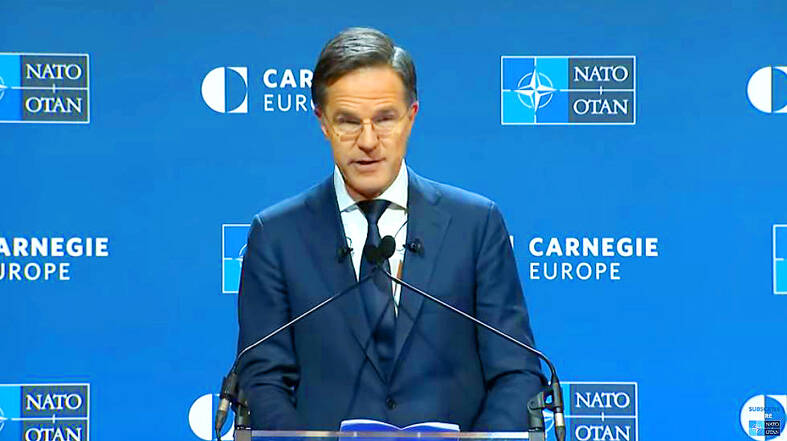NATO Secretary-General Mark Rutte mentioning China’s bullying of Taiwan and its ambition to reshape the global order has significance during a time when authoritarian states are continuously increasing their aggression, the Ministry of Foreign Affairs (MOFA) said yesterday.
In a speech at the Carnegie Europe think tank in Brussels on Thursday, Rutte said Beijing is bullying Taiwan and would start to “nibble” at Taiwan if Russia benefits from a post-invasion peace deal with Ukraine.
He called on democratic allies to boost defense investments and also urged NATO members to increase defense spending in the face of growing military threats from Russia and China.

Photo: Screengrab from NATO News YouTube channel
“We need to be clear-eyed about China’s ambitions. China is substantially building up its forces, including its nuclear weapons, with no transparency and no limitations,” he said.
“From 200 warheads in 2020, China is expected to have more than 1,000 nuclear weapons by 2030. Its space launch investments are skyrocketing,” he added.
“China is bullying Taiwan and pursuing access to our critical infrastructures in ways that would cripple our societies,” he said.
“Russia, China, but also North Korea and Iran, are hard at work to try to weaken North America and Europe, to chip away at our freedom. They want to reshape the global order,” Rutte said.
China is heavily investing in ammunition, accelerating space capabilities and expanding its nuclear arsenal, Rutte said, adding that it is dangerous that “Russia and China are racing ahead” while NATO allies are “lagging behind.”
During a question-and-answer session, Rutte said that the result of peace negotiations between Ukraine and Russia would shape China’s next step regarding Taiwan.
Ukraine must have “positional strength” in peace negotiations with Russia, otherwise, Russian President Vladimir Putin could “come out on top” and secure a deal that is awful for Ukraine, Rutte said, adding that the Russian example could encourage China to take advantage of Taiwan.
Chinese President “Xi Jinping [習近平] will be watching it, and will think: ‘Hey, what does it mean for me in terms of starting to nibble Taiwan to do other stuff in my part of the world.’ So it is crucial that whenever there is a deal, that is a good deal with all the elements in there,” he said.
In Taipei, MOFA in a press release yesterday said that Rutte’s speech is the first public speech he has made since he took office as NATO secretary-general on Oct. 1.
Rutte clearly pointed out the nature of China’s expansion and actions and its aggressive ambition toward Taiwan, the ministry said, adding that he also called for the international society to seriously face the issue of China, Russia, North Korea and Iran challenging global peace, security and order.
“At a time when authoritarian states are continuously expanding their aggressive ambitions, NATO Secretary-General Rutte’s remark has significant meaning,” the ministry said.
Facing authoritarian states strengthening their collaboration and undermining regional peace, stability and international order, Taiwan, a responsible democratic member of the international society, will continue to work with G7 countries, NATO and like-minded partners, in safeguarding peace, stability and prosperity across the Taiwan Strait and the Indo-Pacific region, the ministry said.

The Ministry of the Interior (MOI) is to tighten rules for candidates running for public office, requiring them to declare that they do not hold a Chinese household registration or passport, and that they possess no other foreign citizenship. The requirement was set out in a draft amendment to the Enforcement Rules of the Public Officials Election and Recall Act (公職人員選舉罷免法 ) released by the ministry on Thursday. Under the proposal, candidates would need to make the declaration when submitting their registration forms, which would be published in the official election bulletin. The move follows the removal of several elected officials who were

The Republic of China (ROC) is celebrating its 114th Double Ten National Day today, featuring military parades and a variety of performances and speeches in front of the Presidential Office in Taipei. The Taiwan Taiko Association opened the celebrations with a 100-drummer performance, including young percussionists. As per tradition, an air force Mirage 2000 fighter jet flew over the Presidential Office as a part of the performance. The Honor Guards of the ROC and its marching band also heralded in a military parade. Students from Taichung's Shin Min High School then followed with a colorful performance using floral imagery to represent Taiwan's alternate name

FOUR DESIGNATED AREAS: Notices were issued for live-fire exercises in waters south and northwest of Penghu, northeast of Keelung and west of Kaohsiung, they said The military is planning three major annual exercises across the army, navy and air force this month, with the navy’s “Hai Chiang” (海強, “Sea Strong”) drills running from today through Thursday, the Ministry of National Defense said yesterday. The Hai Chiang exercise, which is to take place in waters surrounding Taiwan, would feature P-3C Orion maritime patrol aircraft and S-70C anti-submarine helicopters, the ministry said, adding that the drills aim to bolster the nation’s offshore defensive capabilities. China has intensified military and psychological pressure against Taiwan, repeatedly sending warplanes and vessels into areas near the nation’s air defense identification zone and across

A Chinese takeover of Taiwan would severely threaten the national security of the US, Japan, the Philippines and other nations, while global economic losses could reach US$10 trillion, National Security Council Deputy Secretary-General Lin Fei-fan (林飛帆) wrote in an article published yesterday in Foreign Affairs. “The future of Taiwan is not merely a regional concern; it is a test of whether the international order can withstand the pressure of authoritarian expansionism,” Lin wrote in the article titled “Taiwan’s Plan for Peace Through Strength — How Investments in Resilience Can Deter Beijing.” Chinese President Xi Jinping’s (習近平) intent to take Taiwan by force